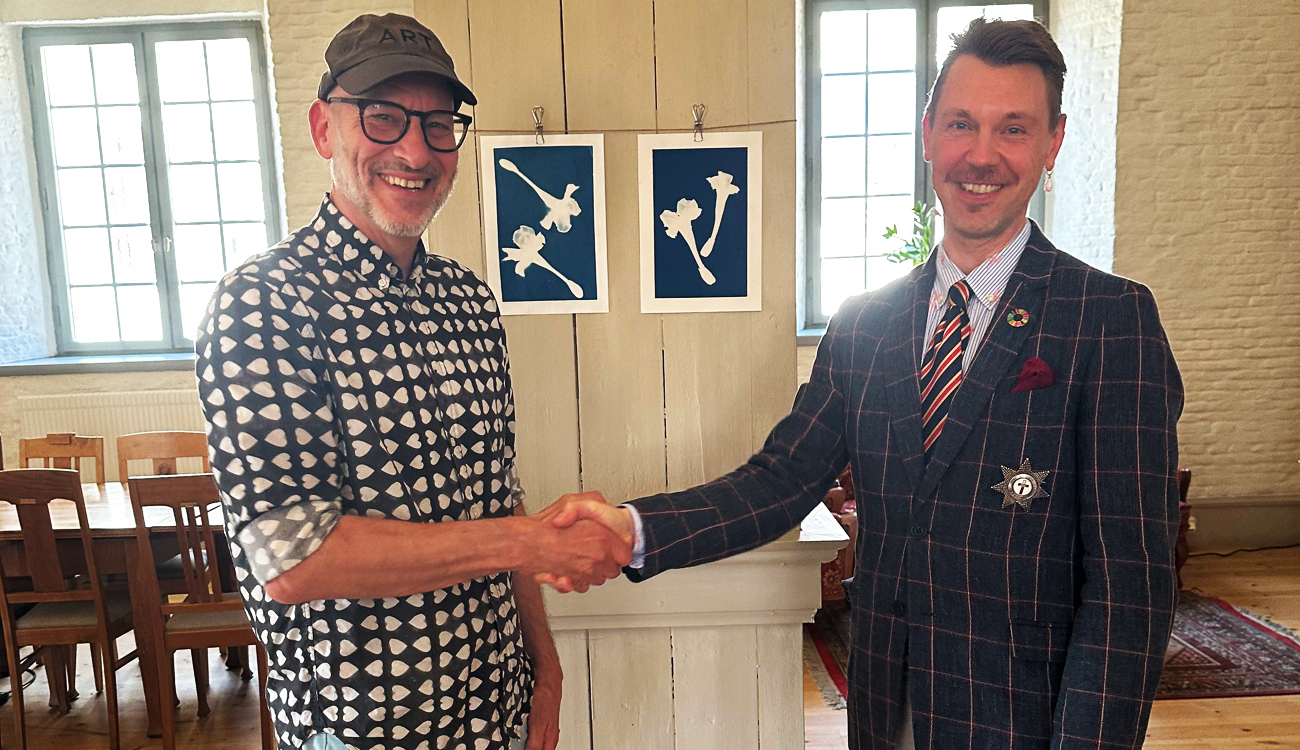
“Arternas Ambassad” – The Embassy of Species emerges at the intersection of art, activism, and public education. Through the ambassador program, the candidate gets to choose a species to learn more about, in order to be their representative in the world. It doesn’t have to be an endangered species; even unloved or “invasive” species like rats, ticks, and Japanese knotweed need someone to speak on their behalf. The very first cohort of ambassadors graduated on May 22, 2023, in Borås, Sweden
The Embassy of Species aims to give a voice to creatures that humans do not easily understand.🐀
Prince Frei granted an audience to Dr. Thomas Laurien (PhD in Design from HDK – Valand), who visited the Prince as a representative of the Embassy of Species Viskan – Borås. The Embassy is part of the non-profit organization Skimmer och Härvor (Shimmer and Tangle), led by Thomas and Theo Ågren, and is based in the Viskan drainage area. The projects are carried out in collaboration with several regional actors, including the Rydal Museum and the Textile Museum in Borås, with funding from the Borås Region and HDK – Valand, University of Gothenburg.
The Embassy of Species is part of a network of similar projects across Europe, loosely united by the common ambition to “listen to, and involve, the voices of plants, animals, microbes, and humans living in the North Sea region.” Members of the network met at the conference “CONFLUENCE OF EUROPEAN WATER BODIES” at the Spanish lagoon Mar Menor in September 2023. The Embassy of Species participated as an ambassador for the river of Viskan and the lake of Vättern.

Skimmer och Härvor’s various projects span across art, public education, science, and civil society, utilizing tools from these diverse fields to contribute to transformed relationships between humans and other species in the world.
Guiding their work is an ecofeminist, non-dualistic, and posthumanist philosophy that urges people to question their hierarchical conceptions of the living planet and our role on it: In a time when landmarks such as waterways and mountains can gain the status of legal personhood, how should we respect their inherent will to act in the world? What obligation of reciprocity do we humans have when we partake in nature’s gifts in the form of food, materials, and oxygen? How does our relationship with an “uncharismatic” species like the rat change when it is scientifically proven that rats are creatures capable of laughter? How should we think about Nonhuman Rights – that is, the rights of non-human persons?

The conversation between Thomas and Prince Frei touched on how habitual use of language can hinder eco-oriented healing work. Expressions such as “the globe,” “invasive species,” “ecosystem services,” “natural resources,” and similar terms reduce the living world to a collection of lifeless objects without intrinsic value. This invites reckless overexploitation, which soon enough affects humans as well. A gentle eco-activist language could involve replacing “the globe” with “Mother Earth” or a more neutral “the planet.” “Invasive species” should actually be regarded as displaced species—exiles that are always spread against their will by humans. Instead of “natural resources,” we can talk about nature’s gifts—this naturally implies that one must also be prepared to give back.
Ecofeminist and posthumanist perspectives reject the ranking of species based on how “intelligent” or useful they are (to us humans). However, some species provide a broader foundation for life than others. These can be called Keystone Species. Here, Thomas illustrated this by comparing the beaver to the tick: from an ecofeminist perspective, each species has an intrinsic value that cannot be compared. Yet, metaphorically, many more species stand on the beaver’s back because its dam-building activities are essential for the survival of other creatures. If the beaver disappears, so might the species dependent on its activities. The Embassy of Species argues that humans need to step up and take responsibility as a keystone species—we must take our role as enablers of more life seriously and actively restore the planet’s ecosystems. We can learn from indigenous peoples who possess practical knowledge about living in harmony with the living world. Primatologist Jane Goodall urges us to begin all such healing “here”—in the local ecosystem that is our closest neighbor. If we think too broadly and too far away, it is easy to become overwhelmed and give up.
During the audience, Prince Frei received assistance in examining his own hierarchical conceptions regarding the relationship between human and non-human persons. Anyone undertaking important work, whether it involves creating thought-provoking art or healing humanity’s relationship with the living world, must be fearless. Thomas quoted author Joyce Carol Oates:
My belief is that art should not be comforting;
for comfort, we have mass entertainment and
one another. Art should provoke, disturb, arouse
our emotions, expand our sympathies in
directions we may not anticipate and may not
even wish.
As a farewell, Thomas Laurien suggested a few books that can further guide thought and action toward a species-inclusive future.
Read more:
Skimmer och härvor webpage (swedish)
Arternas Ambassad on instagram.

Suggested reading list (links to amazon)
Are We Smart Enough to Know How Smart Animals Are? – Frans de Waal
Braiding Sweetgrass – Robin Wall Kimmerer
Staying with the Trouble – Donna Haraway

